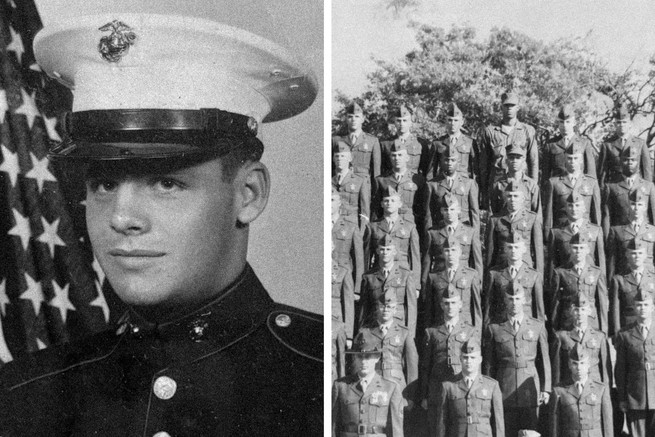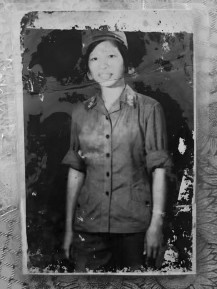‘Okay, I Will Join the Marines’
6 min read
The old Marine Richard “Lefty” Leflar died two weeks ago at his home in West Conshohocken, just outside Philadelphia, mean as ever, at the end of an afternoon of watching football, smoking cigarettes, and eating waffles with ice cream; his body riddled with half-century-old shrapnel, his back killing him, his heart wittering; yelling into the phone at his son, Brian, who lived a few doors away, to “run down the fucking street and carry me up the fucking steps!”
Brian came running.
“The only guy I’ve ever been scared of my entire life,” Brian told me, lovingly.
I met Lefty about 10 years ago, while working on my book Hue1968, about the biggest, bloodiest battle fought by American troops in Vietnam. Gruff, muscular, weather-beaten, tattooed, chain-smoking, drinking beer, gnawing on homemade venison jerky, he spoke with me only after extracting a promise not to sugarcoat his words. Then he had a momentary misgiving.
“I don’t want to make the Marine Corps look bad, you know what I mean?” he said.
He was just 17 when he was hauled before a local magistrate— “I was a bit of a hoodlum” he told me. The magistrate, who held court in his barbershop, told him: “You have got two choices, my man. They really want to put you in juvie—you know we have to put you somewhere. Or join the Marines.”
“Okay,” Lefty said, “I will join the Marines.” A boy who had been arrested with him made the same decision.

Lefty was 18 by the time he was airlifted into the middle of the Battle of Hue (pronounced Hway), so fresh from training that he lacked combat gear and was still wearing his stateside greens, starched and pressed, complete with the stiff regulation cap with the Marine Corps emblem. Hours later he found himself weaponless, huddled in a crater filled with decaying bodies, his clothes blown off, a big gash on his head, cuts all over, bombs and shells exploding all around, too repulsed and horrified to remain in the hole but too terrified to climb out.
The dead “stunk like hell, and you could see, like, a fucking eyeball popping, and they are all fucking purple and what the fuck,” he told me. Then, in his chair, he drew up his legs and wrapped his arms around them and wailed. He said, “Just like that, a little baby, cried like a little girl.”
Lefty’s story was just one of thousands from that battle, but it has always stayed with me as an illustration of what countless young Americans endured in Vietnam. They were ready to fight for their country, trusted in the powers that deployed them, but, as Lefty put it, were largely ignorant of why. “Marine privates are not told too much,” he said, “and are the first to die.” His story contrasts vividly with that of Che Thi Mung, also 18 at the time, from a village just outside Hue, who was caught up and wounded in the same battle, fighting for the other side.

Che was passionate. When I met her in Hue, the same year I met Lefty, she explained that she had been fighting for independence, a struggle that had engaged her family for generations, first against the French and then the Americans. Her father had been arrested and imprisoned. Her older sister had been killed. She herself had been arrested by South Vietnamese troops and waterboarded. Hue was her home. She was fiercely devoted to her cause and was willing to die for it.
As for Lefty: “I knew about Vietnam from boot camp. I didn’t know on the map where it was. As far as Hue, I couldn’t even say the name correctly; I pronounced it Hyoo. I didn’t have a clue as to where I was. I was shell-shocked as soon as I got there. I couldn’t hear, and I walked around in a daze half the time.”
Strip away the Cold War pieties that drew us into that war, and you are left with two teenagers on opposite sides in a sprawling fight to the death: a Vietnamese girl who knew exactly what she was doing and a tough boy from Philly without a clue. More than half a century later, we know that the fears that drove America to war were illusory: that Vietnam would become a satellite of Red China, that the fall of Vietnam would condemn the rest of Southeast Asia to the same fate. Such ideas are as faded as the snapshots that soldiers like Lefty sent home. They ought to make us forever skeptical of all such rationales, and remind us that the casualties of war number far more than the tallies of killed, wounded, and missing, and of those who later take their own life. Today, as the U.S. enjoys friendly relations with a unified Vietnam, it’s hard to even imagine a good answer to the question Why?
Lefty finished his tour and came home angry. He’d seen a great deal of suffering and lost some good friends. He’d witnessed things that broke his heart. He had shrapnel embedded in his head and various other parts of his body, including his back, which would cause many years of suffering. The boy who’d enlisted with him was shot in the head two weeks in, and spent the rest of his life severely brain damaged.
“I was fucked up,” Lefty told me. “I been nuts since the war. I was nuts before I went in. I couldn’t handle my first marriage. It was absolute war—that poor girl had to put up with my shit. And all I did was fight; I would fight anybody. I would walk into a fucking bar and say, Let’s go. You three, outside. I did not care if I got beat up or not. I was nuts.”
After the war, Che was celebrated as a hero. Stories were written about her and the other “Hmong River Girls” who fought in Hue and other places. A statue honoring them was erected near the place where Che was wounded during the battle. It’s now a busy intersection outside a stadium. The shoulder where she got hit still troubles her. She went on to become a doctor. When I met her in 2016, she was retired. She cried as she remembered the terror, the pain, and the friends she had lost.
Lefty stayed angry, mostly at those whose ideas and orders put him and his buddies through hell. He distrusted anyone in authority. When the internet made it possible for him to reconnect with old war buddies, together they built a context for their war experiences, one based on fellowship and love. He was proud of his service, despite everything; proud enough to want me to include his story in the book. He was particularly proud of being a Marine. But he never sugarcoated his experience, and he never saw himself as a hero.
His wife, Donna, told me: “He would say, the only heroes are the ones who are dead.”



